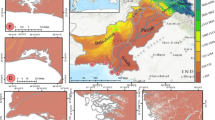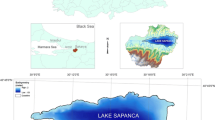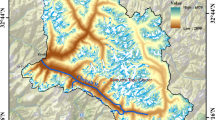Abstract
Shoreline management is essential for navigation, coastal resource management, and coastal planning and development. Shoreline change detection is vital for shoreline monitoring; however, traditional methods used for such detection are laborious and have limited accuracy. An approach that integrates remote sensing imagery and geographic information systems (GISs) is proposed herein to simultaneously identify shoreline changes and perform grid-level visualization for updating shoreline data. The integrated approach uses deep learning-based segmentation networks and water indexes to accurately classify land and sea in remote sensing images. Transfer learning was used to address the issue of insufficient data, wherein weights trained on a large open dataset were applied to the target area. The segmentation results were compared with existing shoreline GIS data to identify the areas experiencing shoreline changes. Grid-level visualization enhanced the identification of regions requiring flexible data updates and investigation efficiency by focusing on specific areas. The proposed approach accurately detected shoreline changes, albeit with some errors of commission, predominantly in regions featuring intricate shorelines and small clusters of islands. The proposed approach offers efficient solutions for shoreline change detection, with potential applications in coastal management, environmental science, urban planning, and coastal hazard assessment.
Similar content being viewed by others
References
Abraham N, Khan NM (2019) A novel focal tversky loss function with improved attention u-net for lesion segmentation. Proceedings of the IEEE 16th international symposium on biomedical imaging (ISBI 2019), April 08–11, Venice, Italy
Alesheikh AA, Ghorbanali A, Nouri N (2007) Coastline change detection using remote sensing. International Journal of Environmental Science & Technology 4:61–66, DOI: https://doi.org/10.1007/BF03325962
Amiri M, Brooks R, Rivaz H (2020) Fine-tuning U-Net for ultrasound image segmentation: Different layers, different outcomes. IEEE Transactions on Ultrasonics, Ferroelectrics, and Frequency Control 67(12):2510–2518, DOI: https://doi.org/10.1109/TUFFC.2020.3015081
Ankrah J, Monteiro A, Madureira H (2022) Bibliometric analysis of data sources and tools for shoreline change analysis and detection. Sustainability 14(9):4895, DOI: https://doi.org/10.3390/su14094895
Astiti SPC, Osawa T, Nuarsa IW (2019) Identification of shoreline changes using Sentinel-2 imagery data in Canggu Coastal Area. Ecotrophic 13(2):191–204, DOI: https://doi.org/10.24843/EJES.2019.v13.i02.p07
Bishop-Taylor R, Sagar S, Lymburner L, Alam I, Sixsmith J (2019) Sub-pixel waterline extraction: characterising accuracy and sensitivity to indices and spectra. Remote Sensing 11(24):1–23, DOI: https://doi.org/10.3390/rs11242984
Boak EH, Turner I (2005) Shoreline definition and detection: A review. Journal of Coastal Research 21:688–703, DOI: https://doi.org/10.2112/03-0071.1
Bouchahma M, Yan W (2014) Monitoring shoreline change on Djerba Island using GIS and multi-temporal satellite data. Arabian Journal of Geosciences 7:3705–3713, DOI: https://doi.org/10.1007/s12517-013-1052-9
Cham DD, Son NT, Minh NQ, Thanh NT, Dung TT (2020) An analysis of shoreline changes using combined multitemporal remote sensing and digital evaluation model. Civil Engineering Journal 6(1):1–10, DOI: https://doi.org/10.28991/cej-2020-03091448
Choung YJ, Jo MH (2016) Shoreline change assessment for various types of coasts using multi-temporal Landsat imagery of the east coast of South Korea. Remote Sensing Letters 7(1):91–100, DOI: https://doi.org/10.1080/2150704X.2015.1109157
Ciritci D, Türk T (2019) Automatic detection of shoreline change by geographical information system (GIS) and remote sensing in the Göksu Delta, Turkey. Journal of the Indian Society of Remote Sensing 47:233–243, DOI: https://doi.org/10.1007/s125240019-00947-1
Guariglia A, Buonamassa A, Losurdo A, Saladino R, Trivigno ML, Zaccagnino A, Colangelo A (2006) A multisource approach for coastline mapping and identification of shoreline changes. Annals of Geophysics 49(1):295–304, http://hdl.handle.net/2122/1962
Himmelstoss EA, Henderson RE, Kratzmann MG, Farris AS (2021) Digital shoreline analysis System (DSAS) version 5.1 user guide. USGS Numbered Series No. 2021-1091, U.S. Geological Survey, Reston, VA
Komolafe AA, Apalara PA, Ibitoye MO, Adebola AO, Olorunfemi IE, Diallo I (2021) Spatio-temporal analysis of shoreline positional change of Ondo State coastline using remote sensing and GIS: A case study of Ilaje coastline at Ondo State in Nigeria. Earth Systems and Environment 1–13, DOI: https://doi.org/10.1007/s41748-021-00270-1
Kumar L, Afzal MS, Afzal MM (2020) Mapping shoreline change using machine learning: A case study from the eastern Indian coast. Acta Geophysica 68(4):1127–1143, DOI: https://doi.org/10.1007/s11600-020-00454-9
Lv Z, Nunez K, Brewer E, Runfola D (2023) pyShore: A deep learning toolkit for shoreline structure mapping with high-resolution orthographic imagery and convolutional neural networks. Computers & Geosciences 171:105296, DOI: https://doi.org/10.1016/j.cageo.2022.105296
Matin N, Hasan GJ (2021) A quantitative analysis of shoreline changes along the coast of Bangladesh using remote sensing and GIS techniques. Catena 201:105185, DOI: https://doi.org/10.1016/j.catena.2021.105185
McAllister E, Payo A, Novellino A, Dolphin T, Medina-Lopez E (2022) Multispectral satellite imagery and machine learning for the extraction of shoreline indicators. Coastal Engineering 104102, DOI: https://doi.org/10.1016/j.coastaleng.2022.104102
Mentaschi L, Vousdoukas MI, Pekel JF, Voukouvalas E, Feyen L (2018) Global long-term observations of coastal erosion and accretion. Scientific Reports 8(1):12876, DOI: https://doi.org/10.1038/s41598-018-30904-w
Mujabar PK, Chandrasekar N (2013) Shoreline change analysis along the coast between Kanyakumari and Tuticorin of India using remote sensing and GIS. Arabian Journal of Geosciences 6:647–666, DOI: https://doi.org/10.1007/s12517-011-0394-4
Mullick MRA, Islam KA, Tanim AH (2020) Shoreline change assessment using geospatial tools: A study on the Ganges deltaic coast of Bangladesh. Earth Science Informatics 13:299–316, DOI: https://doi.org/10.1007/s12145-019-00423-x
Niang AJ (2020) Monitoring long-term shoreline changes along Yanbu, Kingdom of Saudi Arabia using remote sensing and GIS techniques. Journal of Taibah University for Science 14(1):762–776, DOI: https://doi.org/10.1080/16583655.2020.1773623
Oktay O, Schlemper J, Folgoc LL, Lee M, Heinrich M, Misawa K, Mori K, McDonagh S, Hammerla NY, Kainz B, Glocker B, Rueckert D (2018) Attention U-Net: Learning where to look for the pancreas. arXiv:1804.03999
Parthasarathy KSS, Deka PC (2021) Remote sensing and GIS application in the assessment of coastal vulnerability and shoreline changes: A review. ISH Journal of Hydraulic Engineering 27(Supplement 1):588–600, DOI: https://doi.org/10.1080/09715010.2019.1603086
Piana G, Trinquart L, Meskine N, Barrau V, Van Beers VB, Vilgrain V (2011) New MR imaging criteria with a diffusion-weighted sequence for the diagnosis of hepatocellular carcinoma in chronic liver diseases. Journal of Hepatology 55(1):126–132, DOI: https://doi.org/10.1016/jjhep.2010.10.023
Siyal AA, Solangi GS, Siyal P, Babar MM, Ansari K (2022) Shoreline change assessment of Indus delta using GIS-DSAS and satellite data. Regional Studies in Marine Science 53:102405, DOI: https://doi.org/10.1016/j.rsma.2022.102405
Sunder S, Ramsankaran R, Ramakrishnan B (2017) Inter-comparison of remote sensing-based shoreline mapping techniques at different coastal stretches of India. Environmental Monitoring and Assessmen 189(6):1–13, DOI: https://doi.org/10.1007/s10661-017-5996-1
Wei J (2020) Sea-land segmentation dataset. IEEE Dataport, DOI: https://doi.org/10.21227/fgcf-cz74
Yu K, Hu C, Muller-Karger FE, Lu D, Soto I (2011) Shoreline changes in west-central Florida between 1987 and 2008 from Landsat observations. International Journal of Remote Sensing 32(23):8299–8313, DOI: https://doi.org/10.1080/01431161.2010.535045
Zhao X, Wang S, Zhao J, Wei H, Xiao M, Ta N (2021) Application of an Attention U-Net incorporating transfer learning for optic disc and cup segmentation. Signal, Image and Video Processing 15:913–921, DOI: https://doi.org/10.1007/s11760-020-01815-z
Zhong Y, El-Diraby T (2022) Shoreline recognition using machine learning techniques. Proceedings of the IOP Conference Series: Earth and Environmental Science, June 26–30, Melbourne, Australia
Acknowledgments
This research was supported by the Basic Science Research Program through the National Research Foundation of Korea (NRF), funded by the Ministry of Education (2022R1F1A1063254), and by the Korea Agency for Infrastructure Technology Advancement (KAIA) grant funded by the Ministry of Land, Infrastructure, and Transport (Grant RS-2022-00143336).
Author information
Authors and Affiliations
Corresponding author
Rights and permissions
About this article
Cite this article
Park, S., Song, A. Shoreline Change Analysis with Deep Learning Semantic Segmentation Using Remote Sensing and GIS Data. KSCE J Civ Eng 28, 928–938 (2024). https://doi.org/10.1007/s12205-023-1604-9
Received:
Revised:
Accepted:
Published:
Issue Date:
DOI: https://doi.org/10.1007/s12205-023-1604-9




